- Home
- Katherine Paterson
Bread and Roses, Too Page 17
Bread and Roses, Too Read online
Page 17
"I was just telling your sister here," Mr. Broggi said, "that Mrs. Gurley Flynn—you know?" Jake nodded to indicate that he knew who Mrs. Gurley Flynn was. "She telephone to say Mamma and Anna is okay. They still look to find where baby Ricci is taken, but they will find him soon, sure."
Everyone looked at Jake for some response. "Swell. That's just swell." Rosa glared at him. "Except for the baby," he added hastily.
"Mamma and Anna are still in jail, Sal. Maybe you didn't understand."
"Oh. Oh, yeah. But they'll be out soon, won't they?"
Mr. Broggi beamed. "All the big-city papers is there—Boston, New York, Philadelphia. They tell the whole country about shame of Lawrence, beating up women and little children, snatching babies from mamma's breast, throwing innocent women in jail. Everybody in America'll be mad, be mad as hornets by tomorrow morning. It's great day for the union. My friend, Mr. Savinelli, he call it..." He looked around until he had everyone's attention, including Jake's. "He call it 'The Strike for Pane e Rose.'"
Rosa started on the stool. "What?" she asked faintly "What do they call it?"
"Bread and Roses. Is beautiful, no? The strikers carry big sign. It say—" and he used his large stonecutter's hand to shape the words in the air. "It say: 'We want bread and roses, too.'" He beamed. "You understand? Not just bread—hungry, yes. But only bread is not enough. Need roses, too."
Mrs. Gerbati clapped her hands together. "So beautiful!" she said, nodding her head, her eyes closed. "Must be made by Italian."
"It was," Rosa said but so faintly that only Jake, sitting the closest, could hear her.
Mrs. Gerbati herded everyone into the kitchen for cake and coffee. The men laced theirs with some of Mr. Gerbati's grappa. Jake could have used some of it himself, but he didn't dare ask, and none was offered. Rosa picked at her cake, but Jake ate every crumb and took a second slice when Mrs. Gerbati offered.
When Mr. Gerbati returned to the kitchen after seeing Mr. Broggi to the door, he found Mrs. Gerbati at the counter gazing dolefully at her carefully prepared Sunday dinner, which had been left congealing in its own juices since noontime. "He stay so long, my nice food is cold like ice."
"You warm it up," Mr. Gerbati said. "We eat it for supper." He pulled out his watch. "Is nearly time."
She began to protest. "But you have no dinner!"
"Is okay, Mrs. Gerbati. No one here starve today."
"We just had cake," Rosa said. "We'll be fine."
Mrs. Gerbati sighed. "I don't like no one go hungry in my house. Everyone eat extra big supper, okay? Now go, go quick, so Rosa and me can fix everything before your poor bellies start to cry," she said, shooing her husband and Jake out of the kitchen.
Mr. Gerbati went toward his chair but didn't sit down. "You have good trip?"
He must mean with Duncan. "Oh, yeah, swell."
"You see Mr. Bobbie Burns?"
"Yeah. Yessir."
"You see Mr. Corti's work?"
"It's very good."
"Good? Is meraviglioso! Magnificent!" Mr. Gerbati went back and carefully shut the kitchen door. "Sit, Salvatore."
Now it was coming. The time with Duncan had been a tease after all. But he sat as he had been told to. Mr. Gerbati sat down in his usual chair, took his pipe from his pocket, stuffed it with tobacco, and studied the bowl while he made several attempts to light the contents. Finally, satisfied, he took three or four puffs.
Jake, watching the extended scene, was turning to stone on the nearby chair. Hell's bells, why didn't the man get on with it?
"You like Mr. Duncan, no?"
"Yeah, sure. Everyone does."
"He Scot." Mr. Gerbati took another puff. "Like you, maybe?"
"What?"
Mr. Gerbati leaned forward. "You no Salvatore Serutti. You no Italian. I don't know who you are—I don't know how come you in my house, in my shed."
What was Jake supposed to say? He opened his mouth, hoping maybe that something would come out of it that made sense to the man, but nothing did.
"Don't trouble make lie to me. Tell me why you come. You know I don't want no boy, but I let you come, yes? Mrs. Gerbati, isn't she good to you? Don't she feed you like her own child?"
Jake studied the toes of his new boots. Already they were scuffed.
"And today. We try to give you what you need—food, warm clothes—but not enough for you, no?" He shook his head. The hair was thick and white like the snow on his son's grave. "I don't know who you are," he said sorrowfully. "I don't know." He put his pipe back into his mouth and studied the smoke curling above it.
"I didn't mean to come." Jake's voice was so small and unlike itself that he almost didn't recognize it. "I'll leave whenever you say. Only please..."
Mr. Gerbati took out his pipe and leaned forward, listening.
"Please don't call the police."
"What business I got with police? I live in North End. I don't know what you mean. Who do I call? The priest? The mayor?" He sat back. "I don't even call Mrs. Gerbati. I talk to you. I say, Who are you, boy? Why you lie and make little Rosa lie for you, huh? Is not good, making nice girl like Rosa speak for you, lie for you. Where your shame, boy?"
"I need money."
"So you break my safe? You steal from me and my men? Why don't you ask me, like a man?"
Jake kept his eyes on his boots, his voice hardly above a whisper. "I was scared."
"Dio mio. Is that excuse?"
"No, sir."
"Why you need money so bad?" His voice was suddenly gentle.
"I have to buy a train ticket."
"To go home? We buy all the children ticket."
"I can't go back to Lawrence." And then, quite unexpectedly, he realized he was crying. He tried to hide it, but the sobs were shaking his whole body and he couldn't stop. Perhaps it was the relief that Mr. Gerbati wasn't going to call the police or the goons or anyone else. Perhaps it was the hard little man's surprising kindness—like his flowers blooming from the cold gray granite.
The kitchen door opened. Mr. Gerbati shook his head at his wife, and she closed it quickly.
"Go wash your face. Is nearly time to eat. You know Mrs. Gerbati don't like food get cold two time." He got up and knocked his pipe out in the big dish on the table beside his chair. "Later, you tell me. We see what to do, okay?"
Jake sniffed and nodded and hurried to wash up before either Rosa or Mrs. Gerbati could see that he'd been crying.
All through supper, Mrs. Gerbati apologized over the missed colazione. She didn't count the cake and coffee they'd shared with Mr. Broggi, or seem to remember that breakfast had been late and more than bountiful. "I promise to feed you childrens three good meal every day, and today only two. Eat, eat," she urged Rosa, who was picking at her food.
"I'm sorry. I just can't stop thinking about—"
"They be fine, Rosa. It don't help Mamma if you don't eat. See, Sal eat good. Make Mamma happy to see how good he eat."
The food tasted, if possible, better than ever to Jake. Mr. Gerbati wasn't going to call the police or anyone else on him. He sneaked a look in the old man's direction. The white head was bowed over his plate. Looking at him, you'd think he didn't even remember what had happened that morning. But he hadn't forgotten. When the meal was over, he quietly asked Jake to come with him to the parlor. "Now we finish our talk," he said.
Mr. Gerbati sat on the settee and waved Jake toward the rocker, but he chose the stool instead.
"Okay," said Mr. Gerbati. "Now we know you no Salvatore Serutti."
"No, sir."
"Tell me, then, who are you?"
"Jake Beale."
"What kind of name is that? Scotch? French? Irish? What?"
"I dunno. Just my name."
"Where is your papa?"
"Dead."
"That is true? No lie?"
"It's true."
"No mamma, neither?"
Jake shook his head. How much did he have to tell the man? Why was it any of his business any
how?
"So why you sneak and hide, eh? Make little girl take care for you?"
The way he said it made Jake both angry and, if he'd been more familiar with the feeling, ashamed.
"I told you, I was scared."
"Why you scared, boy? You do wrong?"
He nodded. He had done wrong. And before he could stop himself, the whole story poured out—getting the card from Mrs. Serutti to take home for Pa to sign, finding Pa in bed, waking up to discover that all night long, and for how much longer he did not know, Pa had been dead. The horror of it made him stop in the middle of the telling.
"So you run away?"
"Yessir."
"You was afraid of own poor dead papa?"
He didn't want to say so; it seemed suddenly so cowardly. "Well, I was scared someone—the police, maybe—would find him and blame me."
"Why they blame you? Is freezing cold. He drink too much. It happen, yes? Not your doing."
"I bought him the whiskey."
"Ahh." Mr. Gerbati leaned back against the settee to ponder this. "So then you run and sneak onto train...."
"I thought it was going to New York City. Rosa said she was going to New York."
"New York City is better for you?"
"I could get a job. Take care of myself." Jake studied his hands. They were chapped and the nails were black crescents. "I didn't mean to be trouble for her. As soon as we got to New York, I was going to make a run for it."
The man sat forward again. "Why you always run, boy?"
"I just told you."
"No, I don't think so. I think you run away from la morte—from death." He pronounced it "det," which made it sound harsher. Jake wanted to argue but realized he could not.
"So ... you leave your papa there. Who will bury him? Who will make a stone over his grave?"
"I ain't got the money to do that," Jake mumbled. "Even if I was there, I couldn't do nothing for him."
Mr. Gerbati leaned back again. He patted his pocket, looking for his pipe, but it wasn't there. "So," he said. "We make uno patto, what you say, bargain? You and me, we make bargain. You no lie to me no more. You got something to say, you say to me, not send Rosa, okay? You do this, I write union in Lawrence. Tell them to bury your papa. Is not good he not buried yet. Then in spring, I make stone for Papa, okay?"
"Why would you do that?"
"I don't like no man go to grave forgot." He stood up. "We no tell Mrs. Gerbati. Wait for strike to be over, yes? For now, you still her Salvatore."
Home at Last
The Bread and Roses strike! Pride ran like a scarlet ribbon through the anxiety of Rosa's days. People had not only taken notice of their "best sign," some, like Mr. Savinelli, had chosen it as the name of the strike itself. Their sign—hers and Mamma's. The one that she had made on their own kitchen table. And Mrs. Gerbati was right; it was Italian to want beauty almost as much as food.
Rosa was painting a new picture of Mamma and Anna in her head. They were in jail, but Mamma was singing, and all the women and girls and children were singing with her. The guards were amazed and then ashamed as they heard the lovely music coming from the throats of the very people they had despised and abused.
She wandered about in a kind of fog. "We shall not be, we shall not be moved...." Mamma was singing and everyone else would echo:
"We shall not be, we shall not be moved.
Like a tree planted by the water,
We shall not be moved."
That was Mamma—a beautiful tree. She had been green and lush in the spring of Rosa's childhood, when Papa was alive and there was food and fuel, but even in this, the cruelest of winters, she still stood, her strong branches bare, like silver against the snow and wind. She would bend, but she would not break.
There was no more news for two long days, but Rosa was dry-eyed and somehow less afraid than she had been since before the strike began. When she was able, finally, to turn her attention outside herself, she realized that something was going on with Sal. He was too quiet. He ate—he always ate as though he was scared the food before him might suddenly be snatched away—but he kept his eyes on his bowl or his dinner plate. He didn't slurp his soup as noisily or chew with his mouth so wide open. It was as though he was willing himself to seem smaller, less noticeable. When Mrs. Gerbati ladled more zuppa into his bowl or piled more pasta on his plate, he'd glance up quickly and murmur, "Grazie."
Mr. Gerbati was quiet, also, but that was not strange. He rarely spoke during a meal. But now his quietness was different, not the closed-in feel of a man keeping everything so tightly under control that he didn't dare open his mouth. No, his whole body seemed looser, more at ease.
Mrs. Gerbati noticed something, too. Rosa could tell, catching the woman watching each of them carefully, giving her husband a smile for no reason. once, while standing to fill his coffee cup, she rested her free hand lightly on his shoulder. He looked up at her and his eyes were as gentle as Mamma's when she was singing Ricci to sleep.... Ah, Ricci, where was he now? Was he somewhere lonely and afraid?
Saturday had been the worst day of her life. Worse than the day Annie Lopizzo had died. Yet here she was, scarcely four days afterward, feeling better. Nothing had changed. There had been no more news, and then she realized what it was. We shall not be moved. She had never been able to believe it before.
That very evening, Mr. Gerbati came home from his trip to the shop around the corner, his arms full of newspapers. He marched into the kitchen and, without even taking off his overcoat, spread the papers out on the kitchen table.
"Shoo! Shoo!" Mrs. Gerbati ordered. "Pick up this papers! Where I put my food?"
"Later we eat." Mr. Gerbati said. "Come, Rosa, you read. Is English." He handed her The New York Herald.
In a sweep she took in the headlines, and her voice was shaking as she began to read:
BAR SHIPMENT OF
STRIKE CHILDREN;
WOMEN CLUBBED
Youngsters Trampled in Riot
When Lawrence Police
Halt Exportation
MOTHERS FIGHT WITH
TEETH AND HATPINS
Authorities Descend on Station Where
One Hundred Little Ones Were to
Entrain for Philadelphia
Rosa looked up, unable to read further. "Hatpins?" she said faintly. Mrs. Marino, perhaps, but never Mamma.
"Mamma and Anna is all right, Rosa," Mrs. Gerbati said. "We hear, remember?"
Rosa nodded. Even so, reading the rest of the article to the eager Mr. Gerbati was not easy. Pictures of Mamma and Anna and maybe even little Ricci being beaten and trampled flooded her mind.
"You see? You see?" Mr. Gerbati cried. "Whole world angry for your mamma now!" He was right of course—every word in the article railed against the brutality of the Lawrence police and the Massachusetts militia. Her voice still shaking, she went on to the next paper. The Boston Common was equally incensed. "Police, acting under the orders of the city marshal, clubbed, choked and knocked down women and children, the innocent wives and babies of the strikers...." Rosa stopped midsentence. Choked?
"Don't worry, your mamma be okay. Mrs. Gurley Flynn say so," Mr. Gerbati said.
Mrs. Gerbati was stroking Rosa's head, but her hand was trembling. "Knocka down babies," she said. "Who can believe such peoples?"
"Is over," Mr. Gerbati said. "Your mamma win. Now whole world is on her side."
Despite Rosa's renewed anxiety, Mr. Gerbati seemed to be right. Every day brought more news. The whole world had turned against Mr. Billy Wood and his fellow mill owners. Congressmen were calling for hearings. Children who worked in the mills were going to Washington to testify. Even the president, Mr. William Howard Taft himself, was asking for investigations into conditions in American industries. And by week's end there was another letter from Anna, this one posted with a real stamp. It read:
Dear Rosa,
You have heard about the truble at the railway stashnn I think. Do not worry. Mamma and I
are fine. I got a bruz on my arm and Mamma got a bump on her head, but we are ok. We are home from jail. The polees took Ricci to the poor Farm. We did not no where he was, but he is home now and ok to. Mamma says she is sory to giv you so much wory.
The strike is big and better than befor. Mamma says it is wirth a bump on her head and three nites in jail for shure. WE ARE GOING TO WIN. Soon you can come home. We all mis you. Grany J. says the bed is to cold.
Your loving sister Anna,
Mamma and Ricci to
She folded the letter very carefully and returned it to its envelope before she let herself burst into tears.
He supposed he had to tell Rosa, but it included so much lying and hiding the truth that he put it off. She was too worried about her family. She didn't need to hear all his woes—but she would have to, sooner or later. He would wait, he decided, until the strike was truly over. She would be so happy at the thought of going home that she wouldn't waste her time being mad at him and all he'd put her through.
He was still puzzling over his talk with Mr. Gerbati Sunday night. The man had caught him, as they say, red-handed, trying to break into his safe. He hadn't called the police. He hadn't called any of his Italian pals. He had called Duncan. Because he thought I was Scotch. Even then I was sure he would send me back to Lawrence the next day. But, no, he takes me into his parlor and talks to me. He makes a bargain with me, just like I'm somebody. But the bargain was that he would stop lying, and if he hadn't told all that many lies to Rosa, he had certainly never told her the truth.
At work he was a demon of energy, racing to the blacksmith shop with points to be sharpened and racing back again, shoveling grout until his shoulders groaned, clearing fresh snow from the path to the door—indeed, doing every job Mr. Gerbati gave him with such speed and devotion that he hardly recognized himself. Now there were only two things left to do. The first was to tell Rosa everything. That should be easy, but he kept putting it off. Then there was the other matter. This, too, he put off, because it meant a kind of begging he'd never let himself stoop to before. Oh, sure, he had begged Mr. Gerbati not to call the police, but he did that out of sheer terror, without any thought. He had turned this new request over in his mind so many times, he had almost worn it out. How could he put it into words? He had tried a thousand times and no words seemed good enough.

 The Great Gilly Hopkins
The Great Gilly Hopkins Bridge to Terabithia
Bridge to Terabithia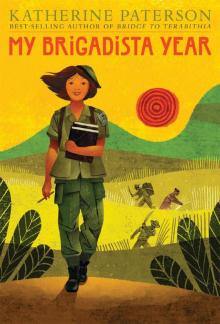 My Brigadista Year
My Brigadista Year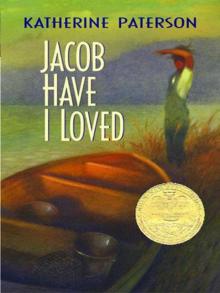 Jacob Have I Loved
Jacob Have I Loved Parzival: The Quest of the Grail Knight
Parzival: The Quest of the Grail Knight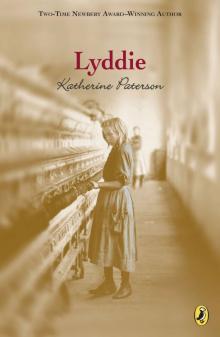 Lyddie
Lyddie The Day of the Pelican
The Day of the Pelican Stories of My Life
Stories of My Life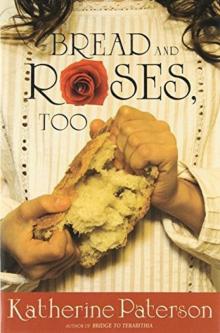 Bread and Roses, Too
Bread and Roses, Too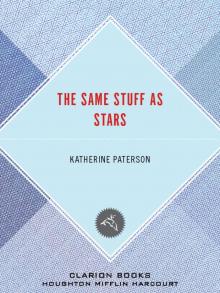 The Same Stuff as Stars
The Same Stuff as Stars